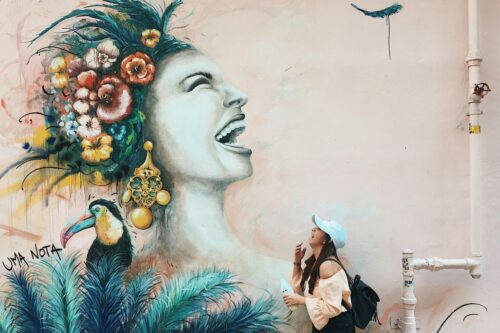Why You Should Immediately Stop Using Self Deprecating Humor

But at what cost? Each time we engage in mocking our authentic autistic traits, it reinforces the narrative that there is something fundamentally lacking or undesirable about us. It buys into the stigma that autism is a punchline instead of a core part of our identity to be embraced with dignity.
The self deprecating humor also often stems from a place of deep insecurity—hoping that telling bad jokes about ourselves of simply being self-critical first, it will soften the perceived “blows” from others. Yet this mindset is rooted in the flawed assumption that we deserve mockery at all. We are human beings worthy of respect, understanding, and acceptance as we are.
Using humor to cover up our discomfort with being autistic is also counterproductive. It’s an unhealthy form of masking that disconnects us from self-love and perpetuates shame. How can we develop confidence and self-advocacy skills if we are constantly making self-deprecating jokes that put ourselves down?
The Roots of Self-Deprecating Humor
So where does this tendency toward self deprecating humor often come from for autistic individuals? Some psychologists point to a few key factors:
- Autism and social difficulties – Many of us struggle with innate social skills and face difficulties with communication, reading social cues, and navigating complex unwritten rules from a young age. Self-deprecating humor can start as a knee-jerk social survival mechanism to try to fit in.
- History of bullying – Unfortunately, autistic youth face extremely high rates of bullying, mistreatment, and ridicule from peers. Internalizing and joining in on the self-deprecating jokes becomes a misguided form of self-protection.
- Identity challenges – With autism bringing feelings of being “different” and the societal stigma that still exists, many autistics experience challenges with self-esteem and self-identity. The self-mocking behavior stems from an unhealthy belief that there is something fundamentally unlovable about ourselves.
- Perfectionism – Research has found many autistic individuals struggle with perfectionism and harsh self-criticism. The self-deprecating jokes are our own inner critic channeled outwards.
While these factors help explain where the self deprecating humor originates, that doesn’t make it any less toxic or detrimental to our mental health and self-concept in the long run.
I’m not saying we can never find humor in our autistic experiences and quirks. There are plenty of healthy ways to laugh at the shared “quirky” behaviors we engage in. Inclusive, self-effacing humor about miscommunications or meltdowns laughs with ourselves – not at ourselves.
But the specific self-bullying, denigrating self-mockery and telling bad jokes desperately needs to stop. So does comparing yourself to other people. We are who we are. And we ARE enough!
READ MORE: Breaking Down Barriers That Challenge Autism and Friendships
Shifting to Self-Compassion Instead of Telling Bad Jokes about Ourselves
We are not the punchline – we are multidimensional human beings with value, worth, and importance. Self-mockery is self-harm, point blank. It chips away at our self-worth, reinforces insecurities, and breeds more shame.
Instead of beating ourselves up, we need to cultivate fierce self-compassion, self-celebration, and unconditional self-love for our whole, authentic, neurodivergent selves.
This inner work is not easy – we have to unlearn years of internalized ableism and societal dehumanization. But we must break the cycles of cruelty we inflict on ourselves.
Building a strong positive identity and sense of self-worth as an autistic person is critical for our emotional well-being. We cannot develop healthy self-advocacy and embrace our rights if we are constantly belittling ourselves.
Let’s build each other up rather than tear ourselves down. It’s time to ditch the self-deprecating humor in favor of self-acceptance, self-love, and respect for every person in all their neurodivergent glory. Our autism is not the punchline – it’s part of what makes us beautifully unique.
READ MORE: Individuation – Why Standing Up For Yourself is So Powerful
Creating a Self-Compassionate Community
Of course, this is all far easier said than done. Healing internalized ableism and negative self-talk is an immense challenge that can require therapy, community support, or other personal work. Self deprecating humor is often a deeply ingrained habit stemming from trauma and systemic dehumanization of autistic and disabled people.
But that makes it even more vital that we create communities centered on self-love and respect – and gently call out instances of harmful self-mockery when they occur. We need to uplift, affirm, and honor each other’s humanity at every turn. Support groups, mentor programs, and community events focused on cultivating self-compassion can help create a positive shared culture.
It’s also crucial that self-advocacy organizations, autism nonprofits, and public figures avoid any hint of self-deprecating messaging that trivializes or insults autistic experiences.
Those meant to represent our community must model unconditional self-respect and dignity. The language and framing should empower and celebrate identity – not perpetuate stigma through mocking or self-bullying.
RELATED: Sharing Life and Autism Social Story Lets Others See Authentic Self
Recognizing Unhealthy Social Patterns
Part of breaking free from the cycle of self-deprecating humor requires taking an honest look at the social dynamics and relationships we’ve formed. In many cases, the self-mocking or making jokes about ASD start as a way to pre-emptively “fit in” with social groups that are subtly or overtly dehumanizing toward autistic and neurodivergent people.

It’s important to have the self-awareness to recognize these toxic situations for what they are. A social group that can only “include” you by dehumanizing your identity is no true community. Complicit self-deprecation may seem to smooth social tensions in the moment, but it perpetuates ableist marginalization long-term.
Rather than contort ourselves, we must have the courage to extract ourselves from denigrating social circles and set clear boundaries. Build connections with those who embrace you without conditional self-mockery. Find communities of people who celebrate, not ridicule, neurodivergence.
The humans worth befriending are those who encourage and inspire you to love yourself more – not pile on self-criticism. Have the confidence to remove yourself from situations where you feel pressured to put yourself down for a cheap laugh. Avoid comparing yourself to other people Your self-worth is precious.
RELATED: Funny or Foul? Opinions Vary on Jokes That Are Offensive
Opening Ourselves to Self-Rediscovery
For many autistic people, abandoning self-deprecating humor requires a deep process of unlearning internalized ableism and harmful societal conditioning. We’ve spent years building subconscious defense mechanisms and insecurities about simply being ourselves.
As we shed that toxic mind virus, we must be open to the self-rediscovery that comes with it. Retiring self-mockery allows us to re-experience ourselves and our autism without distorting lenses. We can re-engage with our special interests, embodied experiences, communication styles, and innermost selves through a new judgement-free lens of curiosity and appreciation.
It can be profoundly healing to rekindle self-acceptance at your purest autistic essence – before learned feelings of differentness and shame tainted that awareness. What brings your brain quiet joy and stimmy self-expression when no inner critic remains? How might you move through the world once fully free from self-dehumanization?
For many, this journey reconnects us to powerful experiences of autistic identity pride. We may discover profound self-love for our autism – cherishing our atypical traits, unique neurology, and way of being as exquisite rather than reasons to denigrate. Our “quirks” become ineffable parts of the entire beautifully complex autistic personhood to celebrate.
As we undergo this self-rediscovery, it’s vital to extend gentleness and patience to ourselves. Heavy conditioning and trauma takes time to unravel. Self-love is a lifelong practice of learning, failing, and trying again. When self-critical thoughts creep in, treat yourself as you would a dear friend – with unconditional warmth, empathy and affirmation of your inherent worthiness.
We are pioneering new frontiers of autistic self-actualization. Boldly claiming our identities and humanity free of self-attack is a brave act of resistance and societal transformation. The self-rediscovery and unbounded self-adoration we unlock is our truest self shining through.
RELATED: Self-Identity – The Ultimate Guide to Finding Your True Self
The Personal Journey of Building Self Love
Of course, building self-love is also a very personal journey. If you struggle with hurtful self deprecating humor, or bad jokes or thoughts, please seek out resources on self-compassion practices. Read works by self-advocates who share powerful messages about autistic pride and disability justice.

And check in with yourself – when you start making those ingrained self-mocking jokes, or comparing yourself to others, pause and reflect on what unmet need they serve. Are you seeking connection, but diminishing yourself in the process? Release yourself from that conditioning and treat yourself with true unconditional positive regard.
Start scripting self-compassionate thoughts as vigorously as you may have practiced self-deprecating ones. “I am proud to be autistic. I am whole and wonderful as I am. I respect myself fully.” Let those positive mantras sink in and drown out any residual demeaning inner voices.
With time and practice, self-celebration can become second nature. And as we spread self-compassion throughout our community, that compassionate mindset will radiate outward. We will boost autistic self-advocacy, rights, and dignity for us all.
Our autism was never the punchline – it’s something to put front and center with effervescent pride. Let’s envision a world where that authentic self-love and celebration for every autistic person’s inherent worth and beauty is the norm, not the exception. It starts by retiring self-deprecating humor once and for all.
RELATED: Learn How to Love Yourself – Autism Self-Care Ideas
The Path Forward to Self-Celebration
While unlearning deeply ingrained patterns of self-deprecating humor is no easy journey, the liberation and empowerment that awaits makes it an undertaking worth pursuing wholeheartedly. We deserve to experience the profound joy and fulfillment that comes with radically loving ourselves – quirks, strengths, struggles and all.
The path forward requires steadfast commitment from every individual autistic person and every community surrounding us. We must have the courage to:
- Decisively reject self-mocking jokes and comments that diminish our inherent worth as human beings
- Separate from social circles and environments that make us feel we must insult ourselves to earn acceptance
- Practice fierce self-compassion, positive self-talk, and unconditional affirmation of our neurodivergent identities daily
- Celebrate our unique strengths, talents, and ways of experiencing the world without apology
- Consciously build a culture of autistic pride, dignity and mutual respect in all spaces we inhabit
- Extend empathy and patience to ourselves and others as we undertake this liberating unlearning process

So to all my fellow autistic people, let this be our rallying call to action: Embrace yourselves with the boundless self-love you deserve. Retire the self-mockery that protects others from giving you basic human dignity, but hamstrings your own growth and happiness. Surround yourself with those who celebrate you unconditionally.
Our autism is a cherished and inseparable part of who we are as individuals and as a collective community. It’s time to shed the shackles of dehumanization, internalized and external, and truly take pride in our vibrant neurodivergent identities. The self-acceptance revolution starts with each of us today.
READ MORE: Autism in the Future: Optimism for Improved Perception and Embracement
Autism in Adults: Living, Learning, and Overcoming Challenges for a Fulfilled Life
Autism in adults requires additional support and coping skills to achieve independence in today’s world.
Learn more about ways adults can live fulfilled lives and the challenges they face.
- 14 Practical Ways for Staying Motivated to Unlock Full Potential
- Autism and Independence: 7 Skills That Empower Individuals to Thrive
- Choosing Happy: How Self-Love Can Outshine Love and Joy Coupling
- Autism on the Brain: Unpacking the Meaning Behind Neurodiversity
- Autism Volunteer Opportunities: 5 Ways Helping Others Fosters Acceptance
- 8 Heartfelt Ways Autism Emotional Support Animals Transform Lives
- Are You An Adult With Autism? Here Are 6 Signs
- Autism After High School: Is College the Next Step?
- Autism vs Asperger’s Syndrome: What You Need to Know
- Autism Disclosure: Is Revealing Your Disorder Helpful or Hurtful?
- Work and Autism: What Employers Should Know About Hiring People with Neurodiversity
- Drivers with Autism Can Achieve Success Behind the Wheel
- Growing Up Autistic: How I Overcame Challenges and Now Thrive
